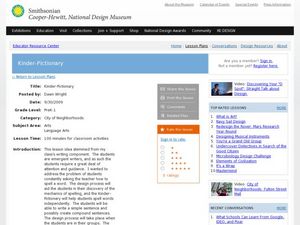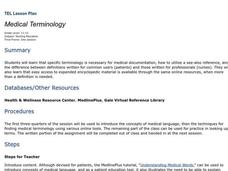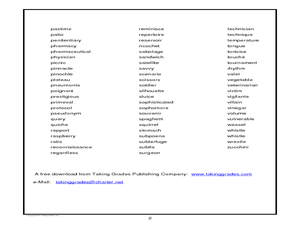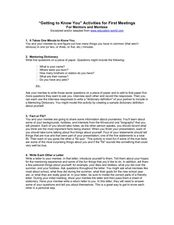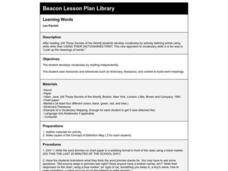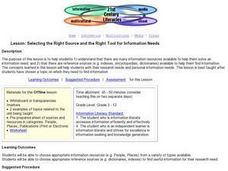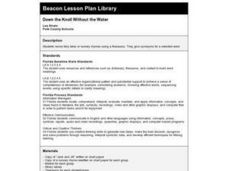Curated OER
Acrostic Poems: What's In a Name?
Students find words that begin with the letters in their own names, using a variety of sources including word banks and online dictionaries. They create an acrostic poem. Pupils revise poems as needed, for meaning and conventions. ...
Curated OER
Online Words
Students use an online dictionary to discover the meaning of vocabulary words. The use of the internet is a skill that is developed for the integration of technology into the curriculum.
Curated OER
Kinder-Pictionary
Students create their own dictionary. In this spelling lesson, students make a dictionary with just words and pictures. They use these dictionaries when they are writing to remember how to spell words.
Curated OER
Medical Terminology
Pupils analyze specific medical terminology. In this medical terminology instructional activity, students research medical terminology and write properly grammatical paragraphs on each word including the scientific term,...
Curated OER
February and Other Words with Tricky Spellings
In this February and other words with tricky spellings worksheet, students use scrambled letters, definitions and a dictionary to identify 65 words with tricky spellings, then write them. A list of more irregular words is included.
Curated OER
"Getting to Know You" Activities for First Meetings
In this getting to know you worksheet, students participate in activities such as fact or fib, dictionary conversations, and more to get to know each other. Students are given 6 activities.
Curated OER
Reference Materials
3rd graders will learn how to use four types of reference materials (Atlas, Encyclopedia, Dictionary, Thesaurus). Each slide includes the purpose for using that specific reference. There are challenge questions included that give mock...
Curated OER
A New Word Everyday: The Hobbit
Learners record unknown vocabulary they encounter while reading The Hobbit. In this "A New Word Everyday" instructional activity, after students record unknown words, they must use a dictionary to find the correct definition and write...
Common Sense Media
ABC Searching
Learners explore English by completing an interactive computer activity. In this alphabet lesson, students research the Internet to create a picture dictionary which they share with classmates. Learners locate digital images of words...
Curated OER
Writing with Vivid Verbs
Pupils find vivid verbs in literature and use them in their own writing. In this vivid verbs lesson, students use a 'Thinking Thesaurus' of major verbs to study common verbs. Pupils then practice rewriting sentences using vivid verbs....
Curated OER
3rd Grade Social Studies Core Skills (Reference Books)
In this reference materials activity, students complete the 20 multiple choice questions pertaining to the correct book needed to find the answer in each situation. Included are dictionary, atlas, encyclopedias, newspapers and maps.
Curated OER
Learning Words
Students listen to Jane Yolen's, All Those Secrets of the World. They engage in activities to find word meanings without using a dictionary. They practice using a vocabulary mapping handout.
Curated OER
Finding Self-Reliance
Fourth graders relate what is read to their own experiences and feelings and use active listening to respond to other students' comments. After a lecture/demo, 4th graders utilize an Active Listening Chart imbedded in this plan to gain...
Curated OER
Reference Source Four Square
Fourth graders play a four-square game on the playground while reviewing four main references -- dictionary, atlas, thesaurus, and encyclopedia. Students must throw the playground ball in the correct "square" identifying the correct...
Curated OER
Selecting the Right Source and the Right Tool for Information Needs
Students review information sources and match tasks up with resources, i.e. definition with a dictionary. They decide on a research topic and find as many places or people or types of materials they can use to find information on that...
Curated OER
Homophones and Vivid Verbs
Students define and practice using synonyms, antonyms, homonyms, and homophones in complete sentences, paragraphs and essays. They include "vivid verbs" in their writing with the aid of a dictionary or thesaurus.
Curated OER
Analogies
In this analogy instructional activity, students answer seven questions using their problem solving skills and vocabulary skills to discover how words are related to each other. Students are encouraged to use dictionaries.
Curated OER
Analogies
In this analogy worksheet, students answer seven questions using their problem solving skills and vocabulary skills to discover how words are related to each other. Students are encouraged to use dictionaries.
Curated OER
Encyclopedia Introduction
Second graders demonstrate how to use reference materials. In this library media lesson, 2nd graders are introduced to the encyclopedia and are shown how to use the encyclopedia as a reference. Students use encyclopedias to complete a...
Curated OER
Analogies
In this analogies worksheet, students complete each analogy by writing the best word in the blank. They are allowed to use a dictionary and there are 7 questions to answer.
Curated OER
Types of Sentences
Fourth graders identify and write different types of sentences. In this sentences lesson plan, 4th graders use pictures and animation to write declarative, interrogative, imperative, and exclamatory sentences.
Curated OER
What's for Dinner? (Using Adjectives)
Sixth graders use adjectives to describe foods listed in restaurant menus. In cooperative groups, 6th graders create menus and identify the adjectives used in the menu created by their group.
Curated OER
Down the Knoll Without the Water
Students use a thesaurus to find synonyms for selected words in fairy tales.
Curated OER
Learning New Words
Students, working in groups, make as many words as possible in a given time, using flash cards that contain prefixes, words, and definitions. They chose group roles and participate in a numbers of time rounds of this activities.




